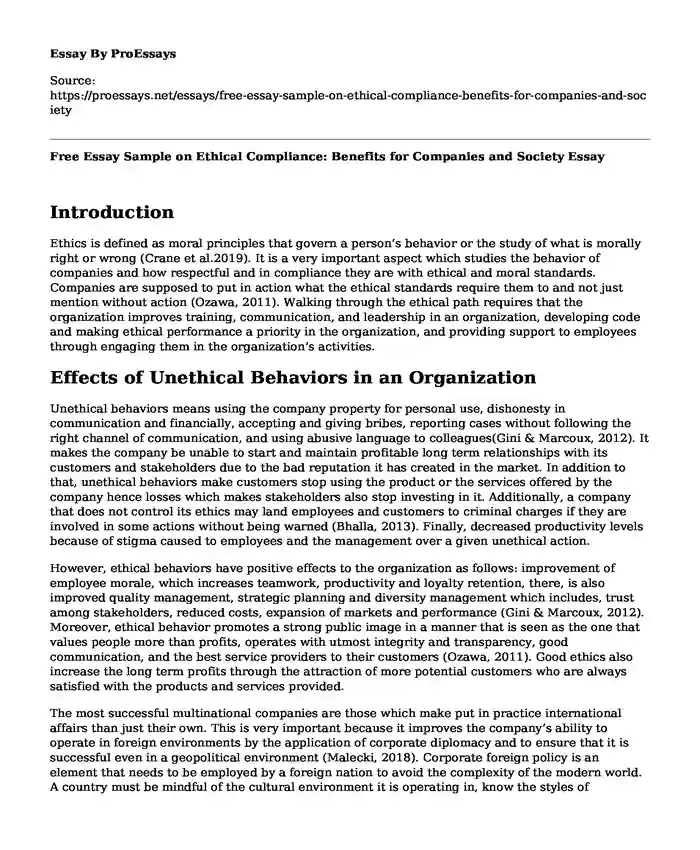Introduction
Ethics is defined as moral principles that govern a person’s behavior or the study of what is morally right or wrong (Crane et al.2019). It is a very important aspect which studies the behavior of companies and how respectful and in compliance they are with ethical and moral standards. Companies are supposed to put in action what the ethical standards require them to and not just mention without action (Ozawa, 2011). Walking through the ethical path requires that the organization improves training, communication, and leadership in an organization, developing code and making ethical performance a priority in the organization, and providing support to employees through engaging them in the organization’s activities.
Effects of Unethical Behaviors in an Organization
Unethical behaviors means using the company property for personal use, dishonesty in communication and financially, accepting and giving bribes, reporting cases without following the right channel of communication, and using abusive language to colleagues(Gini & Marcoux, 2012). It makes the company be unable to start and maintain profitable long term relationships with its customers and stakeholders due to the bad reputation it has created in the market. In addition to that, unethical behaviors make customers stop using the product or the services offered by the company hence losses which makes stakeholders also stop investing in it. Additionally, a company that does not control its ethics may land employees and customers to criminal charges if they are involved in some actions without being warned (Bhalla, 2013). Finally, decreased productivity levels because of stigma caused to employees and the management over a given unethical action.
However, ethical behaviors have positive effects to the organization as follows: improvement of employee morale, which increases teamwork, productivity and loyalty retention, there, is also improved quality management, strategic planning and diversity management which includes, trust among stakeholders, reduced costs, expansion of markets and performance (Gini & Marcoux, 2012). Moreover, ethical behavior promotes a strong public image in a manner that is seen as the one that values people more than profits, operates with utmost integrity and transparency, good communication, and the best service providers to their customers (Ozawa, 2011). Good ethics also increase the long term profits through the attraction of more potential customers who are always satisfied with the products and services provided.
The most successful multinational companies are those which make put in practice international affairs than just their own. This is very important because it improves the company’s ability to operate in foreign environments by the application of corporate diplomacy and to ensure that it is successful even in a geopolitical environment (Malecki, 2018). Corporate foreign policy is an element that needs to be employed by a foreign nation to avoid the complexity of the modern world. A country must be mindful of the cultural environment it is operating in, know the styles of interaction, principles, and moral beliefs. Besides this, a company that intends to cooperate with multinationalism should ensure that it avoids politics so that to protect the interest and its reputation (Bhalla, 2013). Some firms also avoid the intervention of the U.S and its allies due to its engagement in the military operations defeat hence they slowly respond to issues about other nations. Furthermore, firms should have increased the flow of commerce without the intervention of the western countries and the volatility of domestic politics in high growth markets. It is important because understanding the complex internal politics of the western countries may be hard due to the uncertainty.
Corporate Social Responsibility
CSR is a management concept in which companies put together social, economic, and environmental concerns in their business operations and interact with stakeholders to achieve a given balance in society (Bhalla, 2013). The balance includes: environmental management, responsible sourcing, social equity, gender balance, good governance, human rights, anti-corruption measures, labor standards, and employee and community relations.
Improved Public Image
A public image is that which attracts potential new and old customers. CSR gives customers a chance to assess the public image of the company to decide whether to buy from it or not (Jeurissen & Rijst, 2017). For instance, staff volunteering to work in any charitable manner will make customers to be attracted to the company they work hence increased sales.
Conclusion
The application of sustainable systems enables one to even use social media platforms to advertise an activity regarding CSR (Bhalla, 2013). Also, engage the media people who after covering the story, customers will know about it and end up engaging with the company’s brand and operation.
References
Bhalla, V. K. (2013). INTERNATIONAL BUSINESS. Place of publication not identified: S CHAND & CO LTD.
Gini, A., & Marcoux, A. M. (2012). The ethics of business: A concise introduction. Lanham, Md: Rowman & Littlefield Publishers.
Jeurissen, R., & Rijst, M. W. (2017). Ethics & business. Assen, The Netherlands: Van Gorcum.
Malecki, C. (2018). Corporate social responsibility: Perspectives for sustainable corporate governance.
Ozawa, T. (2011). Multinationalism, Japanese Style: The Political Economy of Outward Dependency.
Cite this page
Free Essay Sample on Ethical Compliance: Benefits for Companies and Society. (2023, Oct 13). Retrieved from https://proessays.net/essays/free-essay-sample-on-ethical-compliance-benefits-for-companies-and-society
If you are the original author of this essay and no longer wish to have it published on the ProEssays website, please click below to request its removal:
- Perception of Women Based on Social Views - Paper Example
- The Threat of Comprehensive Overstimulation in Modern Societies Essay
- Aging Black in America Essay Example
- Essay Sample on Tribal Governance
- Kant: Goodwill Impacts Virtue, Character, & Utilitarianism - Essay Sample
- Paper on Technology's Detrimental Effects on Social Development of Children
- Paper Sample on Agricultural Sustainability - A Balanced Perspective







